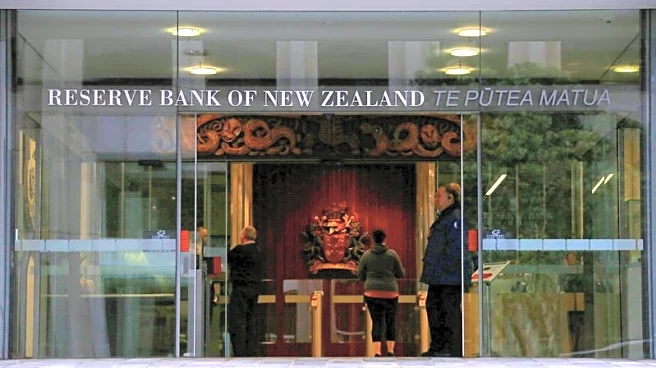By Lucy Craymer
WELLINGTON (Reuters) -New Zealand's central bank cut its policy rate by 25 basis points to a three-year low of 3.00% on Wednesday, and flagged further reductions in coming months as policymakers
warned of domestic and global headwinds to growth.
The New Zealand dollar fell as much as 0.8% to $0.5845, while two year swap rates slumped as deep as 2.96% -- their lowest level since early 2022 -- as the decidedly dovish stance caught markets off guard.
The Reserve Bank of New Zealand said the economy had stalled in the second quarter, and that the committee debated holding rates as well as reducing them by 25 basis points or 50 basis points.
The cut in the official cash rate by a quarter point was in line with a Reuters poll in which all but two of the 30 economists surveyed correctly forecast the RBNZ's decision, after the bank held policy steady in July.
The central bank has slashed rates by 250 basis points since August 2024 to underpin a fragile recovery, taking advantage of expectations inflation will return to 2% next year and to buffer the economy from a broad shakeup in U.S. tariff policy.
“There are upside and downside risks to the economic outlook. Cautious behaviour by households and businesses could further dampen economic growth. Alternatively, the economic recovery could accelerate as the full effects of interest rate reductions flow through the economy,” the RBNZ said in its accompanying policy statement.
The central bank forecast in its Monetary Policy Statement that the cash rate will be at 2.71% in the fourth quarter of 2025, below a forecast of 2.92% in May. In the first-quarter of 2026 it expects it to average 2.55%, lower than the previously forecast 2.85%.
"If medium-term inflation pressures continue to ease as expected, there is scope to lower the OCR further," the statement added.A global front-runner in withdrawing pandemic-era stimulus, the RBNZ lifted rates 525 basis points between October 2021 and September 2023 to curb inflation in the most aggressive tightening since the official cash rate was introduced in 1999.
The punishing borrowing costs, however, took a heavy toll on demand and tipped the economy into recession last year. While, the South Pacific nation has emerged from the slump, growth remains weak and is being further hampered by a slowdown in the global economy and the government’s tight fiscal policy. Adding to the domestic economic stress, unemployment is also rising. New Zealand's annual inflation remains within the RBNZ's 1%-3% target band at 2.7% and the central bank is forecasting it will increase to 3.0% in the third quarter.
(Reporting by Lucy CraymerEditing by Shri Navaratnam)










